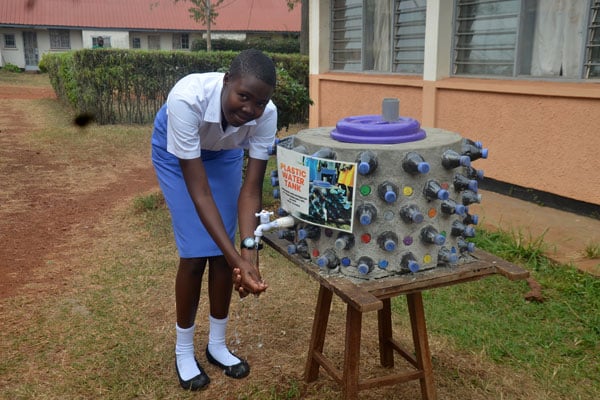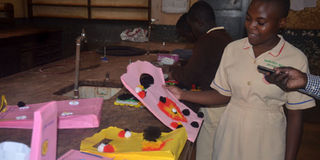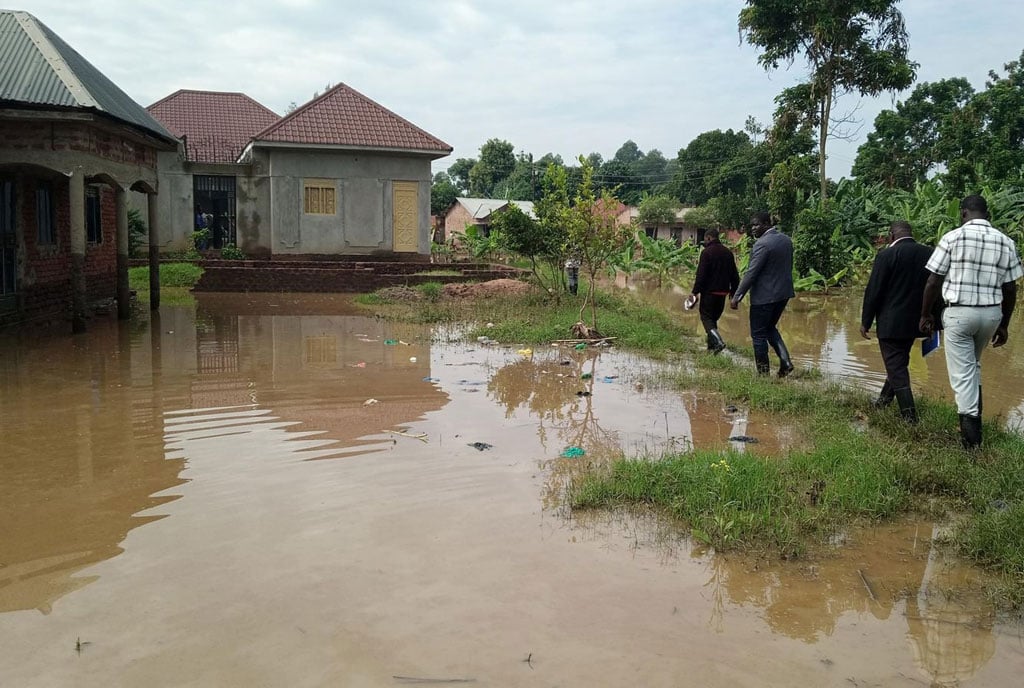Prime
New curriculum creating lifetime skills to save the environment

Cissy Mutesi a senior five student of Wanyange Girls while washing her hands using water from a tank made out of waste plastic bottles. PHOTOS/TAUSI NAKATO
What you need to know:
- Waste management is a perennial problem in the country with some towns and cities littered with rubbish.
- Local authorities usually place the blame on inadequate waste service coverage and failure of residents to pay for waste management. However, as Abubaker Kirunda writes, some schools are untilising recycling activities to keep the environment clean and to solve the waste disposal problem.
In January 2020, the Ministry of Education and Sports (MoES) through the National Curriculum Development Centre (NCDC) rolled out a new competence-based curriculum in lower secondary. The aim of the new curriculum was to meet the learners’ needs with regards to skills training and enhancement.
A number of teachers have wholeheartedly embraced the curriculum. After realising that people earn from waste, Joseph Akeba, the head of the Chemistry Department at Jinja Senior Secondary School is using the new curriculum to transform the environment around the school.
“Some topics in the Chemistry subject have the potential to clean up the environment if taken out of theory and put into practice. For instance, I teach students about the production of biogas, which is key in providing heat needed for cooking, electricity and manufacturing other products,” he says.
Akeba adds that since he gets a new class of students every year, the practical knowledge about how to make biogas will spread faster into the communities from which the students originate.
‘The idea was cemented with the introduction of the new curriculum that gives learners a chance to be involved in at least one project before completing Senior Four and graduating with practical skills. I chose the biogas production project,” he says.

Mark Kawere demostrating how to producing oil from Eucaryptus tree leaves to save the environment.
Making cash from waste
Biogas is a renewable fuel produced from organic matter such as agricultural waste, municipal waste, sewage, wastewater and food waste. The rising problem of waste disposal and the fact that people are more environmentally conscious nowadays has seen the use of biogas, especially in cooking and electricity, gain momentum.
Simon Okiror, a Senior Four student, is part of the biogas production project.
“We collect animal waste from the farm and leftovers from the school kitchen, and the dregs of malwa (millet and sorghum beer) and put them in a jerry can. We add water and leave the mixture exposed to heat from the sun to generate gas. When the mixture begins producing a chemical reaction, a gas cylinder is attached to the jerry can and filled,” he says.
Okiror says the gas is used in the school laboratories during science experiments. In both ways the school benefits by having a cleaner compound and cheap fuel to use in the laboratories, while the students take the skill back to the community.
“I want the people in my community to abandon firewood and charcoal and substitute those fuels with biogas to reduce the rate of deforestation around the country. I expect to earn from this skill in the future,” he says.
Fred Munaale, another student, has embarked on manufacturing pavers out of plastic waste. Using the biogas manufactured by his fellow students, he melts the plastic waste he collects around the school compound.
“I mix the melted liquid with sand and then pour it into a mound to shape the pavers. Within 20 minutes, the end product is ready for use. So far, I have produced 500 pavers, which one of the teachers bought and installed in his compound,” he says.
Bosco Mawogole, the deputy head teacher in-charge of Academics, says environmental conservation has a special place in the school program.
“The school has greatly benefited from these projects, helping us major in environmental conservation. Waste collection is now easier because the students are making dustbins out of plastic water bottles. The dustbins have been positioned around all corners of the school,” he says.
The excess dustbins are sold to people outside the school at a cost of Shs1,000 per dustbin. Other students have taken on producing oil from the leaves of eucalyptus trees. The oil is used as a mosquito repellant and a lotion against skin disease. Others yet, are using discarded polythene bags as carriers for seedlings in their germinating stage.
From plastic bottles to water tanks
A few miles away in Wanyange Girls School, environmental conservation is being piloted to solve the problem of water scarcity.
Yoram Mwambi, the head of the Agriculture Department, says the scarcity arises from the hilly terrain of the school which has always presented difficulties to pumping enough water into the school.

Ms Monica Naikoba a student of Jinja SS while exibiting paper bags made out of waste papers.
“At the beginning of the year, Senior One students came up with the idea of building water tanks using discarded plastic water bottles. This is their skills learning project. The students collect the bottles, fill them up with soil and mix cement with sand to be used in the construction work,” he says.
Currently, the students are concentrating on making 20 litre water tanks with Mwambi supervising the project.
“When we have enough money, we will buy more cement to construct larger tanks. Construction of each 20 litre tank takes up one bag of cement which costs Shs35,000. However, the durability of the tanks is assured because plastic does not decompose,” he adds.
The sample water tanks have been placed around the school compound to foster hand washing among the students. Timothea Mugenyi is one of the students involved in the water tank project.
“Instead of burning discarded plastic bottles – which pollutes the environment – it is better to turn them into something useful. We have many places in the school where we can harvest rain water into the plastic tanks we will make to overcome the perennial water crisis,” she says.
She calls on well-wishers to donate cement to the school to enable the to students build equipment that makes life easier for the population.
Aisha Musenero, another student on the project, says she will make a number of water tanks for her community during the holidays.
“I come from Mbale City and there are a number of trading centres that are littered with empty plastic bottles. So, getting the raw material will not be hard for me. I will make tanks and distribute them to people in my village so that they can keep clean water in their homes, as I conserve the environment,” she says.
Florence Amuge, an agricultural teacher at the school, says the innovation by Senior One students is a positive step towards controlling flooding of roads during the rainy season.
“When the rains come, plastic bottles carelessly discarded on the roads find their way into the drainage system, blocking it. This causes flooding and edge distress on our roads. The new innovation will minimise all that,” she says.
Haruna Mulopa, the acting education officer for Jinja City, says the most important thing about these projects is that the teachers are letting the learners work on them on their own.

Mark Kawere demostrating how to producing oil from Eucaryptus tree leaves to save the environment.
“I am happy that the teachers are empowering learners to be self-sustaining so that they can acquire skills that will help them earn a living in the future. These are lifetime skills that can be employed on the side even as one pursues higher education. If a student is making pavers, dustbins or water tanks on the side while studying, the money he or she earns can supplement their parents’ income,” he says.
Mulopa calls on schools which have not embraced such projects to do so because the projects can help deal with the problem of waste disposal in towns and cities.
“My office is encouraging parents and guardians not to forbid their children from collecting waste material they find littering the city. Waste management in the city is very expensive,” he says.
About 30 percent of the population in the city cannot pay for the collection of their waste and as a result continue to pollute the environment. Recently, Jinja district set up a waste management plant in Masese Parish in Walukuba sub-county. Locals earn from the plant by making fertiliser from the waste and sorting and selling off plastic material waste.
Perhaps, the biggest advantage of these school projects is that they will stop the plastic pollution of Lake Victoria’s shore and River Nile.




